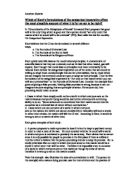The first categorical imperative, the universalisation of actions is known as the formula of the law of nature. Kant says ‘act as if the maxim of your action was to become through your will a universal law of nature’. In other words before you act, ask yourself whether you would like everyone in the same situation to act in the same way. If not, then what you are thinking of doing is wrong because it is against reason. An example of this that Kant used is promise-keeping. Sometimes we break promises because it is easier to break a promise than keep it. However, if you try to make a universal law of the maxim ‘I may always break my promises when it is for my benefit’, it does not work. This is because if everyone made false promises, the institution of promising would be pointless, a promise would be seen as worthless. Therefore this cannot be a moral imperative.
Secondly, is the treatment of people as ends, otherwise known as the formula of the end in itself. Kant said ‘to act that you treat humanity, both in your person and in the person of every other human being, never merely as a means, but always at the same time as an end’. If a person is an end-in-themself it means their inherent value doesn't depend on anything else - it doesn't depend on whether the person is enjoying their life, or making other people's lives better. We exist, so we have value - the fact that we are human has value in itself. This means that we shouldn’t use another human being to achieve a goal based on our personal desires. An example might be, if you were to befriend someone just because they are rich and you want their money. This is wrong because your reason behind becoming friends with them is to use them as a means to an end.
Finally, Kant uses his formula of a kingdom of ends. He said that we should all ‘act as if you were through your maxim a law-making member of a kingdom of ends’. Kant's kingdom of ends is ‘an ideal community in which all citizens are at once the authors and subjects of all laws’. In this community, the only possible laws are laws that could apply to all rational beings. This means that Kant wants us to ask ourselves before we act, whether the maxim of our action could be a law in a world where all humans are treated as an end, and never a means. He believed that each individual person is autonomous and moral judgements should not be based on any consideration of human flourishing or desires. For instance if you tell your friend that he should give to charity and he does so without thinking, then this would be wrong. However if you suggested it to your friend and he uses reason to decide that he will give to charity out of good will, then he has made his own moral judgement as an autonomous human being and this action is right.
To conclude, there are three separated elements to Kant’s categorical imperative. These are known as the universal law of nature, the formula of the end in itself and a kingdom of ends. Together these elements help us to decide whether an action or decision about how we live is morally right or wrong. Kant proposes that reflecting on whether the action or decision can be universally applied; whether it treats each person involved as an end (and not a means to an end); and whether it treats every individual as an autonomous human being, allows us to make morally good and reasoned decisions.








